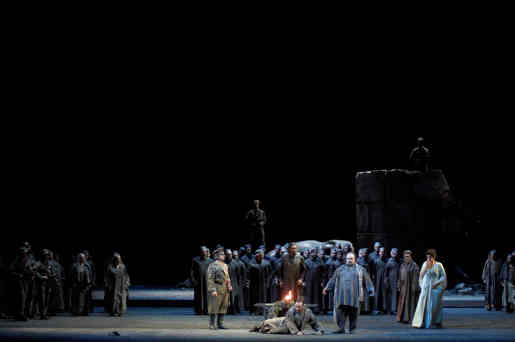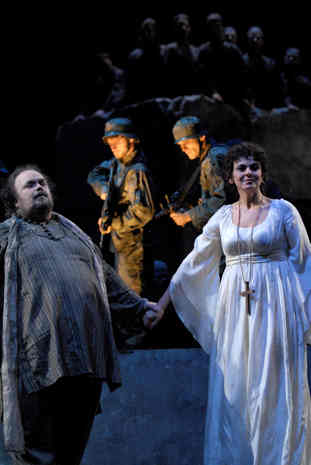Other Links
Editorial Board
- Editor - Bill Kenny
- London Editor-Melanie Eskenazi
- Founder - Len Mullenger
Google Site Search
SEEN
AND HEARD INTERNATIONAL OPERA REVIEW
Donizetti, Poliuto:
Soloists, Orquesta Sinfónica de Navarra. Coro de Ópera de
Bilbao. Conductor: Fabrizio Maria Carminati. Palacio
Euskalduna de Bilbao.
16.02.2008
(JMI)
Nowadays bel cantismo does not enjoy much favour with
artistic directors in most of the opera world. The serious Rossini
operas almost do not exist outside the Festival of Pésaro, Bellini
is only familiar through Norma and
The title role, written for tenor, was taken here by the
Dominican Francisco Casanova, who had already sung the part in a
concert version last year in
New Production by ABAO (The Association of Friends of Bilvao
Opera)
Director: Ignacio García.
Sets and Costumes: Domenico Franchi.
Lighting: Vinicio Cheli.
Cast:
Poliuto: Francisco Casanova.
Paolina: Fiorenza Cedolins.
Severo: Vladimir Stoyanov.
Callistene: Giovanni Battista Parodi.
Nearco: Maurizio Pace.
Felice: Mikeldi Atxalandabaso.

If there is one city in
Spain with a
good bel cantista tradition, then it is
Bilbao.
is Reviewing the history of ABAO (The Association of Friends of
Opera in Bilbao) makes one realize this. So ABAO has taken on
the considerable risk of staging Poliuto, which so far as
I know not been performed any in the world for the last 12
years. It is a big risk, considering that is not easy to
persuade top quality singers to learn an opera, which will be very
difficult for them to have an opportunity to sing again elsewhere.
The truth though is that with some debatable points, the Bilbao
cast offered real quality and the reaction of
Bilbao
public, - considered one of the coldest on Earth by many singers
was exactly what one expects from them, when they get something
that they love. This was huge success, by far the most important
of this season.
Poliuto
is an opera from Donizetti's maturity of with many pages of great
beauty, particularly the concertante that closes the second
act, fine arias for the three maim protagonists and the better
known final duet. Written for
Naples
in 1838, it had to confront Bourbon censorship and it had its
premiere two years later in Paris only in a French version called
“Les Martyrs” in the usual format of a Grand Opera with ballet.
The original Italian version - now presented in Bilbao - was
finally premiered in Naples in November of 1848, hardly one month
after the composer's death. Poliuto never has been inf the
main repertoire, due to its great vocal difficulties, and is known
to the opera lovers largely because of the recording made for
the inauguration of La Scala in December of 1960 with Maria
Callas, Franco Corelli and Ettore Bastianini, under the direction
of Antonino Votto. Poliuto is an opera for great singers,
requiring three principals of the first rank level to succeed. The
rest of the cast don't need to be of quite the same quality, but
that does not mean that they are not important.

Poliuto: Francisco Casanova and
Paolina: Fiorenza Cedolins
Paolina, the real protagonist of the opera, was Fiorenza Cedolins,
whose vocal characteristics responded perfectly to the high
demands of the role. After her successes in
Bilbao in
Masnadieri and Butterfly, Ms.Cedolin achieved a new and
well deserved triumph. I have always thought that this soprano
could be a great successor to Caballé and Gencer among Donizetti
heroines and her performance as Paolina has proved that very
clearly. She gave a magnificent performance throughout the whole
opera, brilliantly living the character at every moment. Her next
debut in Donizetti’s Lucrezia Borgia in Torino promises to
be one of great attractions of the current season.
Bulgarian baritone Vladimir Stoyanov was the great surprise of the
evening as the Proconsul Severo. He produced a beautiful voice
also perfectly suited to the needs of the role, raising the first
signs of rapturous enthusiasm from the audience with his first
aria. This was his best performance so far to my mind and I found
much improved particularly in projecting his higher notes. Until
now, I have always condered him a reliable baritone, but here I
was listening to a genuine potential star.
In the
secondary roles, Maurizio Pace was an outstanding Nearco. He is a
very pleasant tenor of whom we will surely hear more in the
future. Felice, Paolina's father, was Mikeldi Atxalandabaso, who
is becoming an reliable stalwart in such of roles.
Making virtue out of necessity, ABAO offered a new production
with stage direction by the very promising Ignacio García. The
original plot of Poliuto takes place in
Armenia,
around AD 250, and is a conflict between religion and power,
complete with presence of the invading Roman army. Here the action
was transferred to the day and was more Middle Eastern than
Armenian with an American invading army and obligatory
totalitarian postures. The idea of is well developed and works
nicely. Mr García takes full advantage of all the technical
possibilities of the Palacio Euskalduna's stage. The action takes
place on different levels, with the lower level representing the
Christians caves or catacombs. The set are simple and allude to
the plot carefully as when a great statue demolished by the
invaders during the overture and the recreation of the atrium of
Felice's house in the second act, contrasts starkly with ruined
and dusty cave. Most of the action takes place at night and
Vinicio Cheli's fine lighting ploy made the production convncing.
Altogether, this was excellent work from young director.
Conductor
Fabrizio Maria Carminati is a specialist in Donizetti, having
director of the Donizetti Festival in
Bergamo for
some years. He was extremely efficient, able to hold everything
together firmly and was particularly concerned with helping the
singers, some very most important in this repertoire. The
Orchestra played faultlessly for him and the chorus had many
excellent moments, as well as other more problematic ones,
particularly among the men.
The theater offered the usual packed house and the audience was
warmer by far than on former other occasions. The traditionally
cool
Bilbao
public to more than sufficient to provoke enthusiasm. There was
triumphant applause for Fiorenza Cedolins and Vladimir Stoyanov
and Casanova and Maurizio Pace reception was were warmly greeted
too. After this successful Poliuto, ABAO is presenting
Verd’is
La Battaglia
di Legnano
in April. More
good news for real opera lovers.
José M. Irurzun
Pictures © ABAO, Bilbao
Back
to Top
Cumulative Index Page
